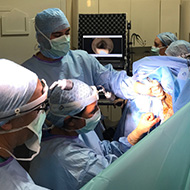BEVA reveals Antimicrobial Awareness CPD

Image (C) Safia Barakzai, equine surgeon.
The British Equine Veterinary Association (BEVA) is marking Antimicrobial Awareness Week (18-24 November 2022) with a CPD course on antimicrobial use in surgery for veterinary nurses, and an online lecture for equine veterinary surgeons.
Free to BEVA members, the course takes place online from Liphook Equine Hospital, and considers what veterinary nurses can do to minimise and prevent the risk of antibiotic resistance and surgical site infections (SSIs).
'Theatre nursing – the key to reducing antimicrobial use in surgery' will run on Wednesday 30 November 2022 from 7pm – 9pm.
Presented by Rosie Heath and Rosina Lillywhite, the course aims to recap and develop attendees' understanding of sterility and biosecurity, understanding of how to minimise SSIs, and understanding of what makes the ideal surgical site.
Rosina and Rosie discussed the course: “We will be taking it back to basics and looking at where improvements can be made, often in areas that are so routine that we forget about their importance.
“It’s a great opportunity to see inside Liphook Equine Hospital, which is one of the largest equine hospitals in the UK and discover how to make your own set-up more gold standard.”
Registration for the veterinary nurse CPD course can be accessed here.
Alongside the veterinary nursing course, BEVA is also running a webinar for equine veterinary surgeons.
Taking place at 8pm on 24 November, the webinar will see Bruce Bladon describe current antibiotic use in equine practice, Victoria South will consider the use of Highest Priority Critically Important Antimicrobials, and Bettina Dunkel will describe strategies to reduce antimicrobial use.
The webinar is free to BEVA members and non-members, and anyone interested can register here.



 FIVP has shared a survey, inviting those working in independent practice to share their views on the CMA's proposed remedies.
FIVP has shared a survey, inviting those working in independent practice to share their views on the CMA's proposed remedies.